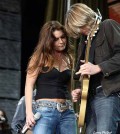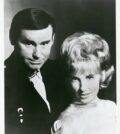- The Appalachian Spirit: 49 Winchester at Two Step Inn Festival 2024
- Wyatt Flores at Two Step Inn: Photos and Review
- Legendary Neal McCoy at Two Step Inn: Review and Photos
- Mark Chesnutt at Two Step Inn: Photos and Review
- Rising Star Sadie Bass Shines at the Faster Horses Festival
- Sawyer Brown at Faster Horses: A High-Octane Celebration of Four Decades
Backstory Willie Nelson
“Blue Eyes Crying In The Rain”
Willie Nelson’s 1975 album “Red Headed Stranger” was a game-changer for the country singer-songwriter. Before that, he had penned hits for others, but his solo career was floundering, and his label RCA was about to drop him.
Willie Nelson recorded “Red Headed Stranger,” for his country & western concept album which is based on a song of the same name written by Carl Stutz and Edith Lindeman and recorded by Arthur “Guitar Boogie” Smith. The album featured “Blue Eyes Crying In The Rain,” a haunting ballad about a doomed outlaw that had been written by Fred Rose back in 1945. Rose, whose country hits include “Crazy Heart,” “Don’t Bring Me Posies,” “Take These Chains From My Heart” and “Kaw-Liga” had recorded the song himself, but it had never been a hit.
Willie’s version of the song, however, struck a chord with listeners. It became his first number-one hit as a solo artist, and it stayed on the charts for over 20 weeks. #BlueEyesCryingInTheRain won Willie his first Grammy for Best Country Vocal Performance, Male.
The song’s success cemented Willie’s status as a legend in country music. He went on to write and record countless classics, including “On The Road Again,” “Always On My Mind,” and “WhiskeyRiver.” But “Blue Eyes Crying In The Rain” remains one of his most beloved and enduring songs, a testament to the power of a simple melody and heartfelt lyrics.
In the years since Willie’s version was released, “Blue Eyes Crying In The Rain” has been covered by countless artists, including Elvis Presley, Roy Orbison, and Conway Twitty. But it is Willie’s version that remains the definitive version, a classic that has stood the test of time.


















You must be logged in to post a comment Login